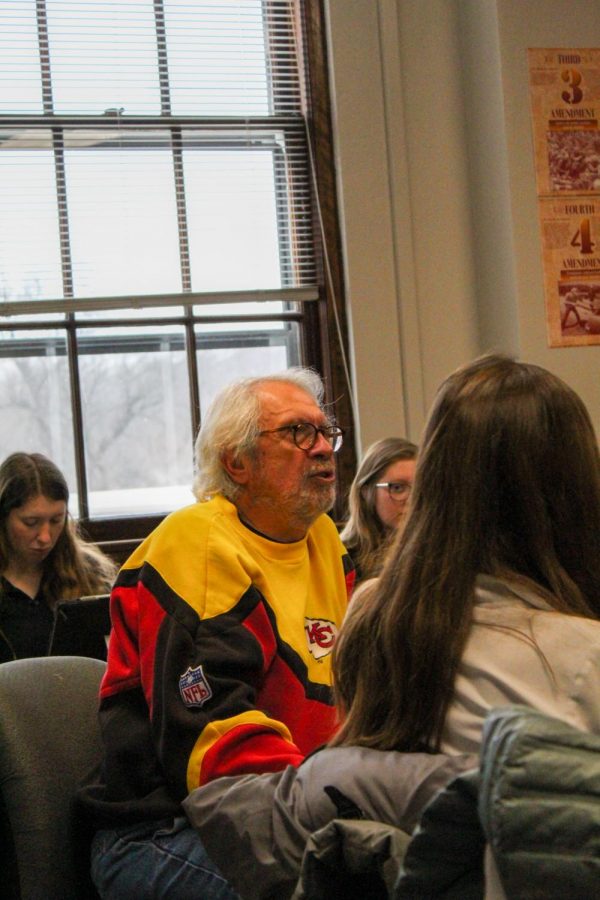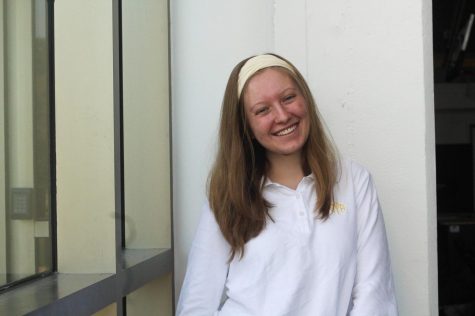Social media breeds biased information
Two-thirds of Americans get at least some of their news from social media, an all-time high according to Pew Research Center.
AP U.S. government teacher Mike Egner lectures his class on the current state of the executive branch Jan. 28. Egner is the moderator of the Current Events club because he wanted to expose members of different grades to the news he talks about every day with his government classes. photo by Katie Massman
February 11, 2020
The only question that social studies teacher Mike Egner has for those who choose to get their news exclusively from social media is “why?”
According to a Pew Research Center report, two-thirds of Americans get their news at least in part from social media as of August 2017. Pew attributes this to being a part of the upward trend of more and more people seeking news from media sites.
“A lot of people — I don’t know why — believe that social media is the only way to get news, Egner said. “In my opinion, it’s probably the worst way to get news because you’re never sure of the source.”
According to Peter Suciu from Forbes, “bias that might not exist in the actual pages of the newspapers does unfortunately have a way of showing up on social media.” With this sentiment in mind, Egner not only advocates for people to stay informed, but he believes in diversifying one’s news sources. As an active follower of current events, he has a portfolio of news sources he draws from. This includes network and cable news channels, and ranges from CNN to Fox News.
“Why not benefit yourself by giving yourself a range of different sources to consult, so that you can be the one to decide what the ‘real news’ is,” Egner said. “Remember what I say all the time — personal responsibility. If you don’t make the effort yourself to increase your knowledge about an issue or a candidate or an event then nobody can help you.”
Current Events Club co-president Molly Langdon attributes the unreliability of social media-generated news to this bias.
“You shouldn’t be looking for your news to see what other people think about it, it’s what you think about it,” Langdon said. “If you find a source that’s not credible, it’s going to be what someone else thinks about it, and then the freedom of how you read things is almost taken away because you’re being forced into this opinion because it’s believed to be a fact now.”
Both Langdon and senior Molly Sexton want to emphasize that young kids are especially at risk for consuming “fake news” or inaccurate accounts of current events now that it is more commonplace for them to be online and on social media.
“Kids are younger and younger on social media, they’ll just believe anything,” Sexton said. “My brother is 11 and he does all the social media stuff and I don’t think he has the knowledge to know what’s true and what’s not true. I think that’s the tough part of it.”
Sexton primarily gets her news from Twitter but acknowledges this news source’s downsides. She cross references her news with other sources, such as other Twitter accounts or official news sites, to make sure she is getting unbiased information.
“[Twitter is] just the most convenient,” Sexton said. “Occasionally I’ll go off and look at other articles, but I also like to see what individual people who aren’t news reporters or journalists have to say. Unless I hear it from multiple accounts, then I can’t assume that it’s 100% true.”
Langdon agrees that Twitter can be a vessel for news but that it is not necessarily accurate news in itself.
“I think people tweeting is definitely a way to keep up if you want to know what’s in the news. I think people tweet about the news, but I don’t think tweeting is news,” Langdon said. “Like when President Trump decides to make a tweet about something that’s already been published, that’s already been news, he’s just making it news for the people who maybe don’t check the sources.”
Although they get their news from different media, Egner, Langdon and Sexton agree that there is an importance to keeping up with the news and share a passion for current events. Langdon especially emphasizes its social aspect.
“I think [keeping up with the news] is really important because if you walk around not knowing anything, then you don’t really have much to talk to people about,” Langdon said. “I like to start conversations… It’s also so that you can talk to people of other generations, too”
As Current Events Club moderator, Egner wanted to expose members of different grades to the news he talks about every day with his government classes.
“I don’t use my phone as much as a lot of people do, but I sure use it a lot more than I used to… before I started teaching government class,” Egner said. “Because I want to be able to share with you guys!”
His opinion on keeping up with domestic and international news is rooted in creating informed opinions on current events.
“If you trust other people to formulate your opinions, God help you, and the rest of the people in this country,” Egner said. “That’s not how a democracy is supposed to work. There’s just so much [news]. You have to discriminate. You have to choose.”




